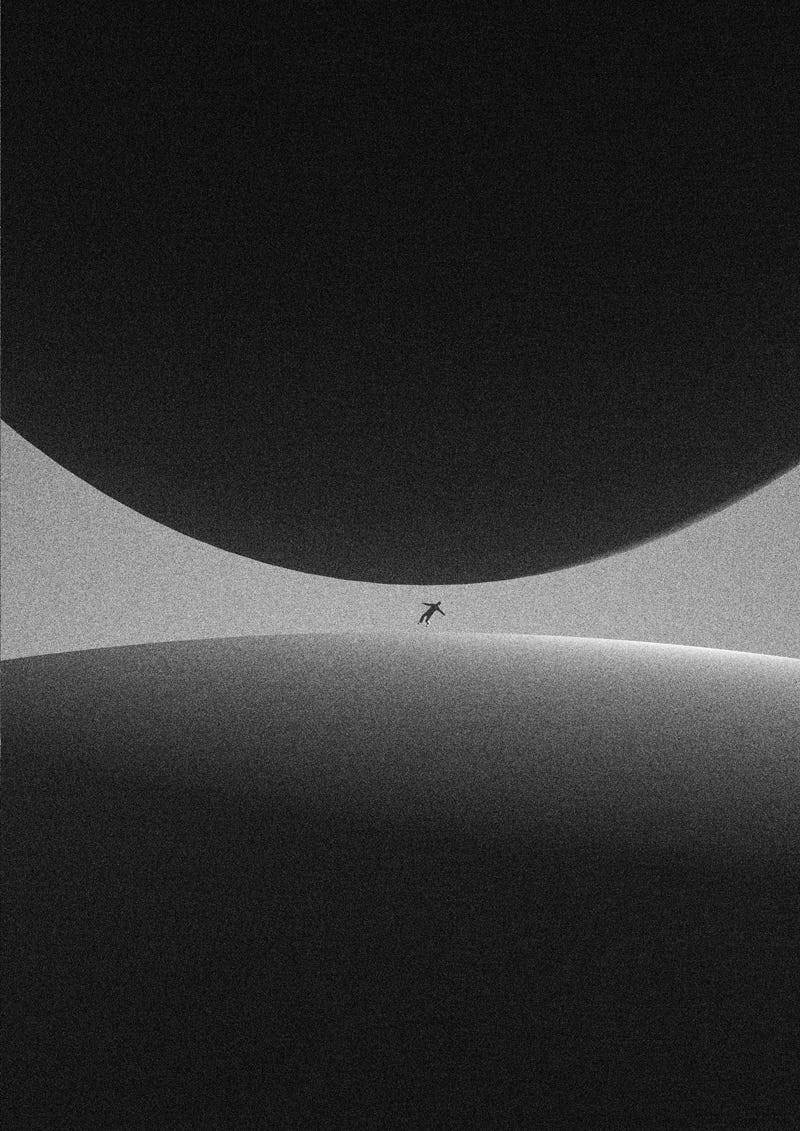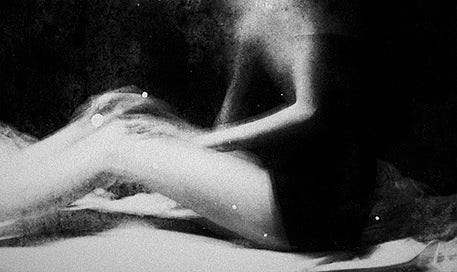What
is
Language
if not
the musical stirrings
of the soul,
if not
the unequivocal, imperceptible
muse
reaching and searching
[if not
every unknown sound
beyond the
limitless
edge]
ever forward toward
s o m e unse(e)able
eternity,
shapelessly alone
in the numinous palm of
some luminous
hand? What was Language before the stars shaped the Earth, before humans invented alphabets and words? What is the nature of Language now as we know it, as humans on this earthly plane?
Defining / Deafening Language
To grasp the ancient and permeating essence of Gesamtkunstwerk (an uncommon term in the quotidian lexicon), it would behoove us to first understand the term’s true origins; indeed, its etymology, but more precisely, its linguistic progenitor: Language.
Long before our hearts knew Love and our eyes, the blessing of dawn, Language was nothing but the shadow of a vast emptiness, the umbra nihili1. Language was infinity, pure and resolute; the mellifluous susurrus of Space—a deafening silence pulsating through the endless echo chamber of Night. Language was empyrean poetry; an orchestral oeuvre of the spheres, theatrical and purgative. Betrothed to Nothing, Language was Nothing; it transcended Time; it transcended purpose. It did not aim to measure or resolve. It simply reflected what was—and still is.
Today, Language is not so esoteric. It became a thing. It became an idea, a tool, a system—with its own terrestrial Weltanschaaung—from no-thing to some-thing. Defining ‘language’ nowadays typically whittles down to its word-like nature—representing the means to a potential end. Impure, language is both practice and term, hedged by numerous definitions—e.g. a body of words and the systems in place to a common people; a particular way of expressing oneself. It isn’t intentionally ironic or meta, I don’t think, but Language uses language to define itself. (What other choice does it have?) Language is also symbolic → as with sign language. Language can be defined as one’s diction or phraseology; the expression of local jargon in a slough of accents; it is both noun and adjective, concept and system. It’s exhaustive; and its use, largely watered down.
Even so, what this advanced system has permitted us to do as humans is not only recognize and express what we see, but how we see (and hear, and feel, and taste and touch)…because Language, at its very core, operates as an objectively subjective vehicle (not the other way around).
“Through the opening of the mouth, we bring out sounds from the mountain beneath the soul.”2

Most people today would would say ‘language’ is a tool—a dialectic approach to being human. Period.
And yet, despite all of its empirical and poetic implications as a ‘word’ or ‘concept’ or ‘ideal’, terrestrial language, like Universal Language, is simply a conduit of communication—an opportunity to reveal “how each of us [and the Universe] relentlessly creates.3” Language thus fuels creation (and destruction); Gesamtkunstwerk (and the umbra nihili); gnosis (and tabula rasa). Stick with me.
From Language, came “Aa”, then Art
Millions of years ago in eastern Africa, a certain australopithecine (an early ancestor of homo sapiens) was believed to utter the first word on planet Earth. The word was “Aa”, though it likely sounded more like, “Aaaaaaaaa”.4 How anyone could actually prove this is beyond me. Though, theoretically speaking, “Aa” is a pretty good guess. Logical. (So is “Ee”, “Ii”, “Oo”, or “Uu”, phonetically speaking.)
Then, as in now, language belonged to the body—found its home in the body—thus it was (and still is) through the Body (i.e. darkness, ether, space, cells a.k.a. the conduit) that words were (and still are) formed. Humans relied on the eyes and spirits of others as their mirrors. As their soundboards. They looked to the natural world, scrying, observing, notating above and below—the animals and plants, stars and seasons—for a deeper understanding of what would ultimately become their Weltanschaaung.
Self-awareness was the reverberation of one’s environment, tempered in both the natural and mythical worlds (through song, dance, hunting, cooking, eating, fucking, pissing, shitting, strategizing, building, wandering, or dreaming, etc.), while in community with others. At one point in time, humans came to know themself through experience alone, through the the eyes of the world, or the gaze of another’s. Consciousness and Language were one in the same, rich pools of imagination. Screens and books and politics weren’t around yet to distract the human spirit. Ah
~
Life:
You’re born, you scream, you live, you die.
~
The body invoking the art tempering the work. The art fueling the work reflecting the body. The work as the body as the art.
“Against the infinity of the cosmos and the silent depths of nature, the human face shines out as the icon of intimacy.” - John O’Donohue
This is how Art came to be. Through the language of the body. Mimicry or “mirroring” became its own conduit of communication, its own ‘language’: the wail of a child; one’s reaction to pain; the witnessing of something formidable; experiencing an orgasm for the first time; a new discovery; being alive, you get the picture. All viable means to producing a certain “Aaaaaaa” sound. All viable means to producing a visual/sensorial rendering of a previous action or observation (Art).
Thus, from Language came “Aa” then “Art”, and from their symbiosis, the term ‘language’ as we know it today: a body of words and linguistic expressions.
—but, wait, what about Science?
What about it? Science is a marvelous thing, a miraculous human invention; a trailblazing mass of minds and -ologies that rapaciously feeds an ever expanding body of knowledge—and trust me, I am grateful for it. Yet, all we’ve managed to prove, all we’ve managed to figure out, (talking in broad strokes here), is that we are still lightyears away from understanding the grand matriarch that is Darkness; that we are walloping simpletons in comparison to the infinitely complex shadow of nothingness beyond. In this world, language, like science, has become its own arcane edifice: its own breeding ground of transgressive, erratic and multivariate stimuli (and their wanton or arbitrary permutations) ambling toward the light of Truth. But Language, unlike science, has nothing to prove. It is the conduit, not the voice.
Gesamtkunstwerk < > Gnosis
Gesamtkunstwerk
Gesamtkunstwerk translates to “total artwork”—gesamt: total; kunst: art; werk: work. Generally speaking, it is the weaving together of ideas and the creative synergy of multiple systems to create a dynamic and unified whole.
If this is so, Language may very well be Gesamtkunstwerk’s first untold example; an example that existed long before the term entered the modern lexicon.
In his essay ‘Aesthetics, or Doctrine of Worldview and Art’, the German philosopher and theologian, Karl Friedrich Eusebius Trahndorff employed (and birthed) the term, Gesamtkunstwerk, into visual existence. The year was 1827.
While I cannot expertly speak to the term’s profundity, nor to its vast usage throughout history, what I’ve come to learn of Gesamtkunstwerk is that its varied applications can be distilled down into 5 primary nodes. They are:
Philosophy;
Aesthetics;
Weltanschaaung (worldview);
Art; and
Music (and/or Theatre, or “the integrated drama” as Wagner says.)
And it is through these nodes that we refine the Universal Language.
Gnosis
Let’s get poetic again. Humor me.
If Language is indeed “the musical stirrings of the soul,” let’s imagine words as the notes, and the body (the physical or metaphysical body), as the assortment of instruments at our disposal; think of these notes and instruments as pedagogic excrements of artistic expression! [A “dump” of your imagination.] Sometimes banal, sometimes clever, sometimes insane, sometimes extraordinary.
Through this conduit of communication (that is L/language), we allow ourselves to discover and enjoy some of today’s most treasured gifts: music, the human spirit, the natural world. But language also holds within it the potential for deeper knowledge; transcendental and mature understanding. Otherwise known as gnosis.
In the hearth of our own spirits, we long to belong.
Cultures At Large / The Human Spirit / The Natural World
Gesamtkunstwerk is everywhere. It can be applied to a litany of things, past or present, living or extinct. Through the lenses of Cultures at Large, the Human Spirit and the Natural World, I will loooooosely explore various examples of Gesamtkunstwerk through the objectively subjective vehicle that is language. It’ll be personal and observational.
In parts I, II and III, I’ll probe like a little cipher, discussing elements of Richard Wagner’s The Ring of the Nibelung and its residual effects on cultures at large; the Bauhaus school, what it accomplished in the art of pedagogy and ways it strengthened the human spirit at the dawn of WWII; and finally, the circular ecosystem of poop a.k.a. bowel movements within and without the natural world.
Each ‘lens’ will be published as separate posts entitled, ‘Gesamtkunstwerk pt. I’, ‘…II’, and ‘…III’ respectively.
Stay tuned…
P.S. If any of this resonated with you, share it with someone else who you think may enjoy it, too. Liking, commenting, and sharing means (and honestly helps) a lot. <3
Thanks for being here. Lots of love.
~
The German language is its own didactic Bauhaus.
Music is its own holographic universe.
Sound is color is color is sound.
Kinetic energy requires as much soluble fiber as a healthy bowel.
~
In the words of the fourteenth-century mystic, Meister Eckhart, “All of human life stands under the shadow of nothingness, the umbra nihili” (Source).
Anam Cara: A Book of Celtic Wisdom by John O’Donohue (Prologue, p. xv)
Anam Cara: A Book of Celtic Wisdom by John O’Donohue (Chapter 1, p. xv )
“What Was the First Word Ever?” by Emilio Brown (A-Z Animals)






middle section reminds me of this, 'Uttering a word is like striking a note on the keyboard of the imagination' (Wittgenstein, probably 'Philosophical Investigations')
This was so fulfilling to read - a feast for my soul. Especially moving through language and what it means for little Ro who can only cry, poop and yawn :) thank you for sharing your gift Darb <3